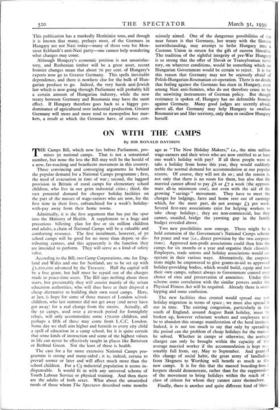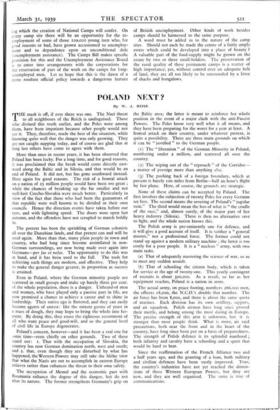ON WITH THE CAMPS
By SIR RONALD DAVISON
rE Camps Bill, which now lies before Parliament, pro- mises 5o national camps. That is not a sensational number, but none the less the Bill may well be the herald of a new, far-reaching and beneficent movement in this country. Three convincing and converging arguments lie behind the popular demand for a National Camps programme ; first, the need of evacuation in time of war ; second, the laggard provision in Britain of rural camps for elementary school children, who live in our grim industrial cities ; third, the vast potential demand for cheaper holiday facilities on the part of the masses of wage-earners who are now, for the first time in their lives, enfranchised for a week's holiday- with-pay away from their home towns.
Admittedly, it is the first argument that has put the spur into the Ministry of Health. A supplement to a huge and precarious billeting plan for five or six million children and adults, a chain of National Camps will be a valuable and comforting resource. The first instalment, however, of 5o school camps will be good for no more than depots or dis- tributing centres, and this apparently is the function they are intended to perform. They will serve as a kind of safety valve.
According to the Bill, two Camp Corporations, one for Eng- land and Wales and one for Scotland, are to be set up with £1,200,000 advanced by the Treasury. Half the capital will be a free grant, but half must be repaid out of the charges made to peace-time users. The Bill says nothing about these users, but presumably they will consist mainly of the urban education authorities, who will thus have at their disposal a cheap alternative to building their own rural camps. Here, at last, is hope for some of those masses of London school- children, who last summer did not get away (and never have got away) for a real change from the streets. Actually, all the 5o camps, used over a 20-week period for fortnightly relays, will only accommodate some 170,000 children, and perhaps a fifth of these may come from L.C.C. London. Some day we shall aim higher and furnish to every city child a spell of education in a camp school, for it is quite certain that some kinds of instruction and some of the highest values in life can never be effectively taught in places like Battersea or Bethnal Green. Not the least of these is health.
The case for a far more extensive National Camps pro- gramme is strong and many-sided ; it is, indeed, certain to prevail sooner or later and will affect much more than the school children. For a C3 industrial population it seems in- dispensable. It would fit in with any universal scheme of Youth Labour Service or physical training. And then there are the adults of both sexes. What about the unsatisfied needs of those whom The Spectator described some months ago as " The New Holiday Makers," i.e., the nine million wage-earners and their wives who are now entitled to at least one week's holiday with pay? If all these people were to take a holiday from home this year, they would suddenly treble the normal demand for accommodation at our popular resorts. Of course, they will not do so ; and the reason is, not only that there is no room for them, but also that the married cannot afford to pay L6 or L7 a week (the approxi- mate all-in minimum cost), not even with the aid of the growing " savings " movement. They have to meet the charges for lodgings, fares and home rent out of earnings which, for the most part, do not average L3 per week. Several first-rate associations exist for helping workers to take cheap holidays ; they are non-commercial, but they cannot, unaided, bridge the yawning gap in the family budget revealed above.
Two new possibilities now emerge. There might be a bold extension of the Government's National Camps scheme for peace and war (i.e., direct provision by the two corpora- tions). Approved non-profit associations could then hire the camps for six months or a year and organise their clientele. Employers, trade unions and holiday associations would co- operate in their various ways: Alternatively, the corpora- tions might be empowered to give grants-in-aid to approved holiday-providing bodies, which would build, equip and run their own camps, subject always to Government control over choice of sites and preservation of amenities. Under this scheme some correlation with the similar powers under the Physical Fitness Act will be required. Already there is over- lapping and some confusion.
The new facilities thus created would spread out our holiday migration in terms of space ; we must also spread it out in time. The existing congestion, particularly in the south of England, around August Bank holiday, must be broken up, however reluctant workers and employers may be to abandon this strange manifestation of the herd instinct. Indeed, it is not too much to say that only by spreading the period can the problem of cheap holidays for the masses be solved. Whether in camps or otherwise, the average charges can only be brought within the capacity of the average married worker if the accommodation is kept rea- sonably full from, say, May to September. And granted this change of social habit, the great army of landladies from Skegness to Worthing will benefit as much as the new camps. It is for this that the massed boarding-hou- keepers should demonstrate, rather than for the suppressio: of the movement to bring holidays within the reach of a class of citizen for whom they cannot cater themselves.
Finally, there is another and quite different kind of bless- mg which the creation of National Camps will confer. On every camp site there will be an opportunity for the re- employment of some of those roo,000 young men who, for good reasons or bad, have grown accustomed to unemploy- ment and to dependence upon an unconditional dole (unemployment assistance). The Camps Bill makes specific provision for this and the Unemployment Assistance Board is to enter into arrangements with the corporations for the reservation of part of the work on the camps for long- unemployed men. Let us hope that this is the dawn of a more resolute official policy towards a dangerous feature of British unemployment. Other kinds of work besides camps should be harnessed to the same purpose.
A word must be added as to the nature of the camp sites. Should not each be made the centre of a fairly ample estate which could be developed into a place of beauty ? A valuable part of the food-supply might be grown on the estate by two or three small-holders. The preservation of the rural quality of these permanent camps is a matter of high importance, yet, without control over an adequate belt of land, they are all too likely to be surrounded by a litter of shacks and bungalows.



































































 Previous page
Previous page